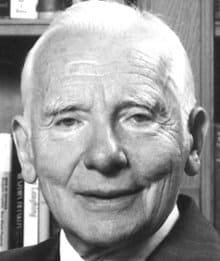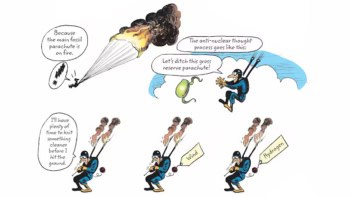By Hamish Johnston

This week’s episode of the radio programme Great Lives focused on Joseph Rotblat, the Polish-British physicist and peace campaigner who died in 2005. The format of the programme involves a discussion of the person’s life with a celebrity admirer – in this case the UK’s Astronomer Royal Martin Rees – and an expert on the subject. The latter was Rotblat’s friend and colleague Kit Hill, who is also a physicist.
Rotblat (pictured right, courtesy Nobel Foundation) was born to Jewish parents in Warsaw in 1908. He narrowly escaped the Nazi occupation in 1939 when he travelled to Liverpool to work at the university. From there, he went to the US, where he worked on the Manhattan Project to develop the first nuclear weapons.
He was the only scientist to quit the project for conscientious reasons – after seeing first hand how difficult it was proving to make a bomb, he concluded that the Nazis had no chance of succeeding and therefore the Manhattan Project was no longer purely a defensive act. Upon returning to the UK, he devoted his scientific career to studying the effects of radiation on living organisms.
In 1955 he joined forces with Albert Einstein, Bertrand Russell and other leading intellectuals to issue the Russell–Einstein Manifesto that alerted world leaders to the dangers of nuclear weapons and warfare. This led to the founding of the Pugwash Conferences on Science and World Affairs, which shared the 1995 Nobel Peace Prize with Rotblat himself.
The most intriguing question that the programme’s host Matthew Parris put to Rees and Hill is why Rotblat appeared happy to work on nuclear weapons when he knew that they could be used to kill Germans, but then recoiled from the idea when he realized that they looked destined to be used against other peoples?
You can listen to Great Lives here.



